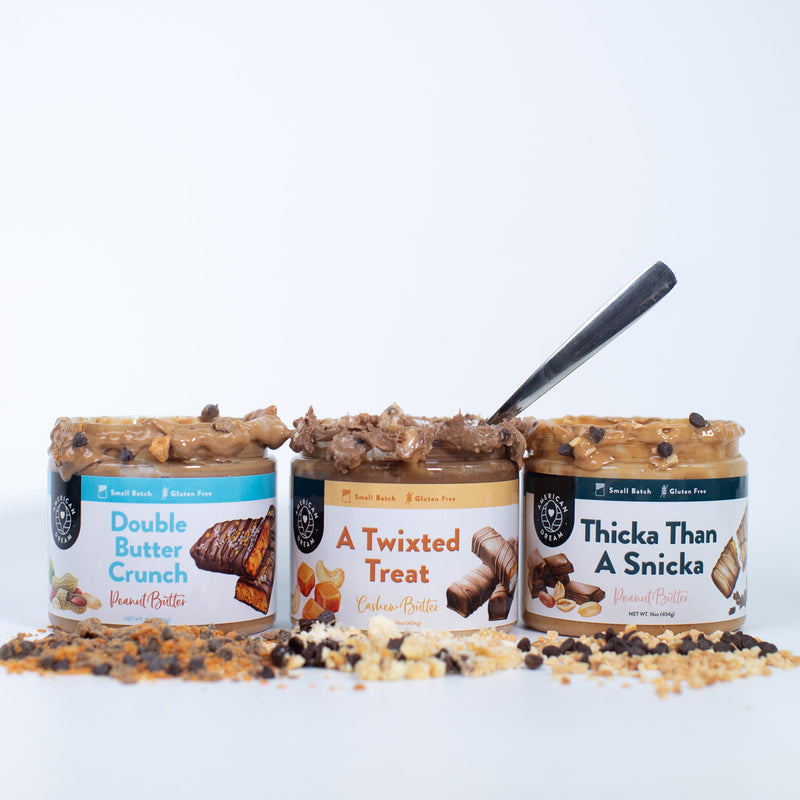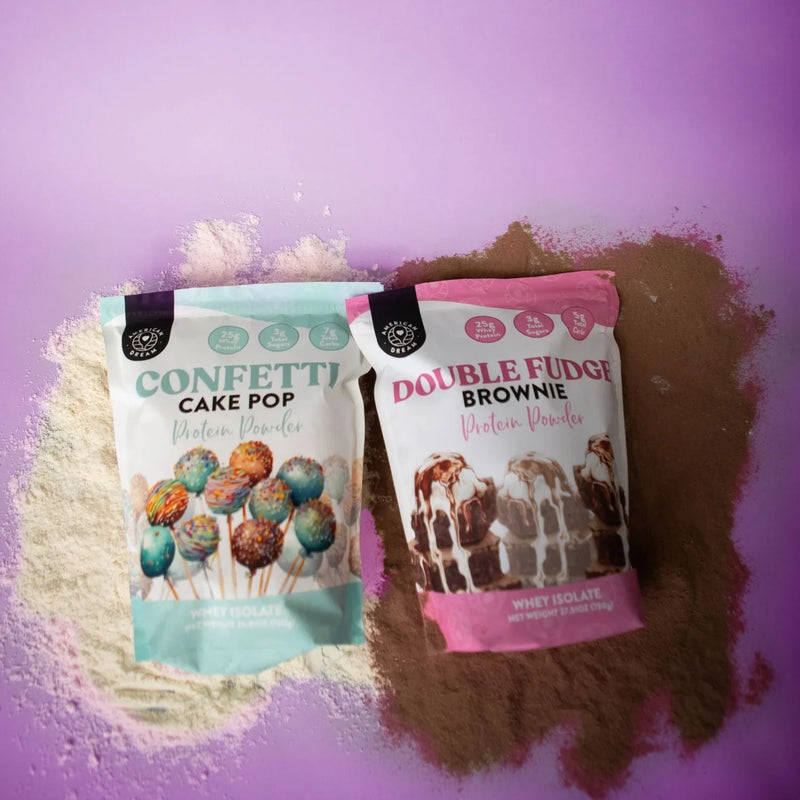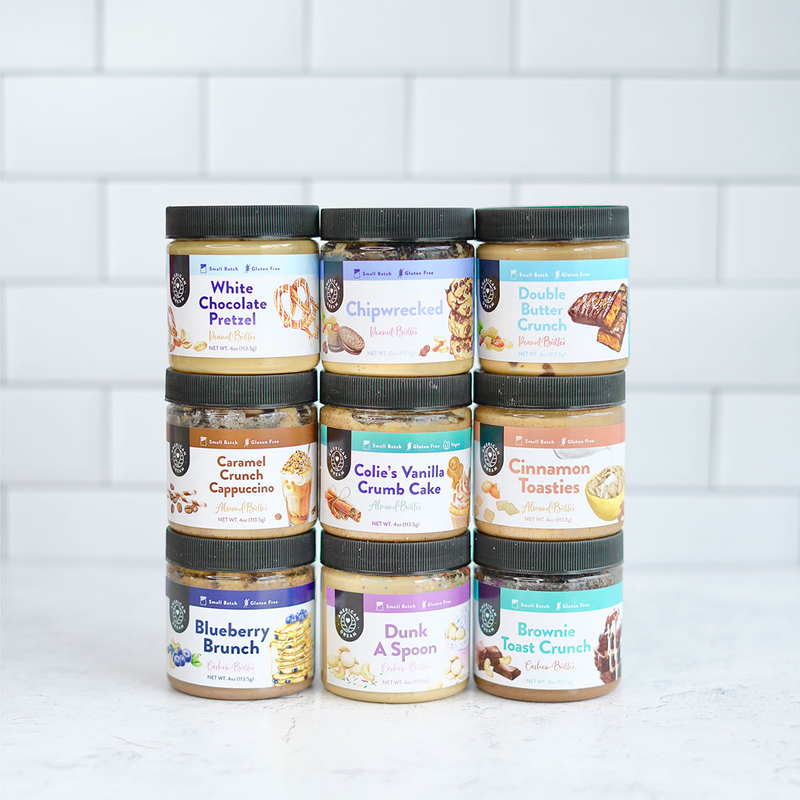The Amazing Benefits of Almond Butter
It's not a secret anymore! Nuts are a great alternative to sugary snacks and junk food.
But all nuts are different, especially when it comes to their nut butter. The popularity of almond butter has grown by more than 300% in the past decade, according to Google Trends. This is not surprising considering its health benefits and that almond butter is quickly becoming everyone's favorite kind of nut butter.
Here's everything you need to know about this nut butter that is taking over:
Almond Butter Nutrition Facts
Almond is one of the most nutritious foods you can have daily. It's estimated that one tablespoon of plain almond butter contains:
- 98 calories
- 9g fat
- 1mg sodium
- 3g carbohydrates
- 1.6g fibers
- 0.7g sugar
- 3.4g protein
Almond butter is rich in Vitamin E, which helps boost your immune system. A single serving of this nut butter can provide 26% of the daily allowance of Vitamin E.
Almond butter also contains L-arginine, plant sterols, and omega-3 fatty acids. The latter plays a vital role in eye and brain health, while plant sterols prevent the bloodstream from absorbing cholesterol. From improving blood circulation to helping kidneys flush out waste, L-arginine plays a role in several body processes.
Other nutrients found in a creamy spread of almond butter include potassium, magnesium, iron, calcium, and manganese.
Health Benefits of Almond Butter
With so many nutrients, almond butter is more than just a staple in pantries across the nation. It offers many of the same health benefits as whole almonds. Keep reading to learn more about the amazing health benefits of almond butter.
Good for Heart Health
Almond butter is rich in monosaturated fats, which help lower LDL (bad) cholesterol and triglyceride levels, which contribute to increased buildup of plaque in the arteries. Monosaturated fats also help raise GDL cholesterol levels, thus improving the health of blood vessels.
The omega-3 fatty acids in almond butter help improve cardiac health and prevent heart disease by maintaining a regular heart rhythm. L-arginine helps with healthier artery walls, and Vitamin E stops plaque buildup in the arteries.
Optimal almond nut intake reduces the risk of cancer, cardiovascular disease, and death due to diabetes, infections, and respiratory issues. It also helped lower the risk of coronary heart disease.
Promotes Bone Health
One tablespoon of almond butter contains 45mg of magnesium and 50mg of calcium. Almond is one of the nuts with the highest calcium content, and each tablespoon provides 8% of your daily recommended dietary intake of calcium.
The mineral is crucial for strong bones and teeth. So if you are concerned about your calcium intake and would rather avoid dairy, try a dollop of almond butter.
The same tablespoon of almond butter gives you 20% of the daily recommended dietary intake of magnesium. It helps regulate muscle function throughout the body, controls cholesterol production, and regulates the sleep cycle. Magnesium also helps the body absorb calcium, thus promoting optimal bone health.
Helps Control Blood Sugar
Almond butter is good for people with diabetes. It is low in carbohydrates but high in fiber, healthy fats, and protein. This helps with managing the rise of blood sugar and insulin levels after eating.
Consuming 2 ounces or 45 almonds can help lower the levels of fasting glucose and fasting insulin. The participants of the study were able to reduce their caloric intake. It could also help increase insulin sensitivity in pre-diabetic people.
Almond butter contains magnesium, a nutrient which 25% to 38% of people with Type II Diabetes are deficient in. By correcting this deficiency, almond butter helps diabetics improve insulin levels and lower blood sugar levels.
Good for the Brain
The nutrients in almond butter promote cognitive health. A 2020 study recently investigated the impact of almonds on the cognitive health of elderly adults. Participants who ate three ounces of almonds daily for six months showed significant improvements in visual memory, visuospatial working memory, and spatial planning.
Research has also shown that Vitamin E can help prevent the early onset of dementia and Alzheimer's disease, both of which affect cognitive function. Balanced vitamin diet can help delay the progression of Alzheimer's in patients with mild to moderate symptoms.
Almond butter is rich in Vitamin B6, which helps produce neurotransmitter chemicals. These chemicals improve communication between brain cells. It contains zinc, a mineral that boosts the immune system, thus preventing viral and bacterial infections that may affect brain cells.
Helps with Appetite Control
The high fiber content in almond butter helps with suppressing appetite. A research study that involved a sample of 42 women sought to test whether consuming almonds as a mid-morning snack could reduce hunger.
It found that almonds do a better job of suppressing mid-morning cravings than snacks like crackers. This is because almond butter is a nutrient-dense food that digests slowly, making you feel full for longer periods compared to other snacks.
Another reason you may feel for satiated and full from almonds is its combination of fiber, proteins, and monosaturated fats. This makes almond butter a great investment for anyone who's trying to lose or manage their weight.
Good for the Skin
Did you know that Cleopatra incorporated almonds into her skincare routine? And while we aren't suggesting you spread almond butter on your face each evening, ancient Egyptians were aware of the benefits of almonds for the skin.
They contain several nutrients that are good for the skin, such as Vitamin E, which protects cells against free radicals, UV rays, and other intrinsic factors that may damage the skin.
Almond butter contributes 6% of the daily value for niacin and 25% of the daily value for riboflavin. Both B vitamins help maintain healthy skin. Almonds also contain linoleic acid, a fatty acid that prevents skin dryness. Last but not least, copper in almonds plays a role in hair and skin pigmentation.
Repair Cell Damage
The Vitamin E in almond butter is rich in antioxidants, which play a critical role in repairing cells damaged due to oxidative stress. Consequently, this helps reduce the risk of conditions like diabetes, obesity, and some cancers.
The fact that almonds contain more Vitamin E than other tree nuts means it has more antioxidant compounds like flavonoids and polyphenols.
What to Watch Out For
While it has many health benefits, there are a few things to watch out for when you purchase almond butter. Ensure you check out the ingredient list. Some brands add oils and sugars, which results in extra fats and calories.
Almond contains oxalates, which can be problematic for people with a history of kidney disease. Limit your consumption of almonds or almond butter if your doctor advises you to reduce oxalates intake.
Approximately 30% of people who are allergic to peanuts are allergic to almonds. Talk to a doctor about a diagnosis or management if you or your child are allergic to peanuts.
When you buy almond butter, it can last months if left unopened at room temperature. Once opened, the jar will last for 3-6 months if stored in the refrigerator. If you make almond butter at home, it will last for about two weeks in the refrigerator.
Commercially available almond butter comes in several varieties. At American Dream Nut Butter, each jar of almond butter is free of additives, low carb, gluten-free, and low sugar.
How to Enjoy Almond Butter
Almond butter is delicious, and you can enjoy it in more ways than one. It makes for a great mid-morning snack.
Try pairing it with an apple or a cup of raspberries for a delicious treat that will keep you full until lunch. A teaspoon of our Bundle Up Blondie Almond Butter will do if you are short on time.
Adding a tablespoon of Just Plain Nutty Almond Butter to overnight oats makes for a delicious, filling, and healthy start to your day. Or you could mix it into your morning smoothie or spread it on your favorite pancakes. The possibilities for an almond butter breakfast are endless.
There is nothing wrong with experimenting, so why not replace your go-to butter with almond butter? Start by using it as a substitute in instances where you use peanut butter. Almond butter will instantly raise the nutrient density of your food and get the above health benefits.
Almond Butter is a Versatile and Healthy Addition to Your Diet
The nut butter market has expanded significantly over the past few years and includes more than just peanut butter. In addition to being trendy, almond butter offers several health benefits that make it a worthy addition to your diet.
Whether you are a mother, a nutritionist, or crazy fitness, almond butter is more than a tasty treat. It boosts cognitive health, bone health, skin health and aids with healthy weight loss. Shop the best almond butter from American Dream today to enjoy the above benefits.
Thank you for the information very helpful
Thank you. I have been combining almond, peanut and pumpkin seed butters for years. Delicious.
Thank you for the nutritional benefits information of almonds
 All Nut Butters
All Nut Butters
 Newest Flavors!
Newest Flavors!
 High Protein
High Protein
 Butter Bundles
Butter Bundles
 Indulgent Butters
Indulgent Butters
 Cookies
Cookies
 Nutrition
Nutrition
 Retiring Soon
Retiring Soon
 Paws Off
Paws Off
 Sample Sizes
Sample Sizes
 Merch
Merch
 Gifting
Gifting

